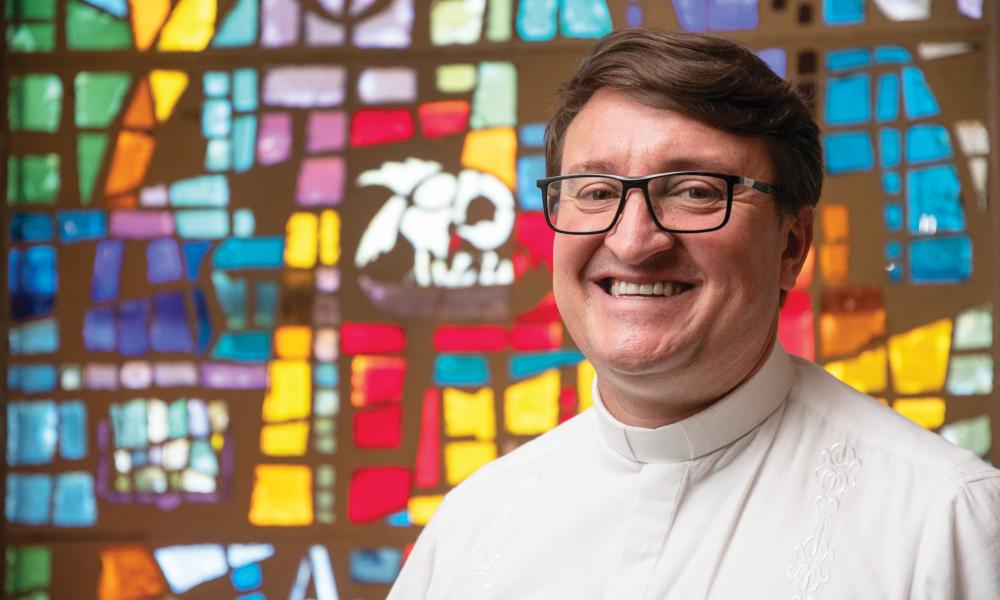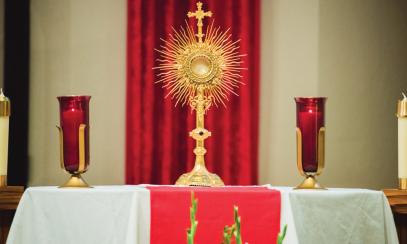
Meditations on the Eucharist
“How many times do you eat every day, every week, every month, every year?”
“How many times do you eat every day, every week, every month, every year?”
I asked this of the children during their First Communion Mass in May. They responded: “Three, five, 10 times. Many times. A lot. Too much.”
Then I asked, “What will happen if you don’t eat regularly?” After thinking a little while, they said, “We get hungry. We get sick. We starve. We die.”
After this, I asked, “Do you want to be weak, sick, starving or dead?” They answered “no” without hesitation. They all wanted to be strong, to be healthy and to live.
This dialogue, along with the readings that we selected for the First Communion Masses (Proverbs 9:1-6, 1 Corinthians 11:23-26 and Mark 14:12-16, 22-26), inspired these meditations on the Eucharist.
FOOD FOR STRENGTH.
We need to eat to be strong, healthy and fully alive. Just as the body asks for food, the soul, too, craves nourishment to have fullness of life. Properly feeding our souls is as necessary as feeding our bodies. Otherwise, we risk starvation that leads to fragility, all sorts of illnesses and sin and eventually spiritual and physical death. Undoubtedly, to be fully alive we ought to be bodily and spiritually nourished.
FOOD TO SATISFY HUNGER.
We need to eat regularly to satisfy our hunger and thirst. Often, we experience bodily hunger and thirst, then we have the urgency to look for food and drink. Likewise, our soul, mind and heart long for spiritual food and drink, so we have the same urgency to feed ourselves with the Word of eternal life, the bread of life and the cup of salvation. Our body loathes the feelings of hunger and thirst; so do our hearts, minds and souls— even when it does not seem as evident.
FOOD FOR HEALTH.
We do not want to be sick, weak and tired. We yearn to be sound and healthy. We desire life in its richness now and forever. We fear physical, intellectual and emotional infirmities, pain or suffering and loss of life. The whole of our souls dread temporal and eternal spiritual death. Whether we are wholly aware of this or not, whether we accept it or not, our entire being longs to have the abundant life Jesus himself promised.
FOOD FOR ABUNDANCE OF LIFE.
The meditations above lead to one conclusion: we ought to nourish our body, soul, mind and heart regularly to experience abundance of life. The Eucharistic celebration provides us with that spiritual nourishment.
From the table of the Word, we are fed with God’s wisdom to know better God’s will, designs and timing. This spiritual food helps us contemplate ourselves, others, creation and God himself.
At the Eucharist, as in the upper room, we gather around the table with Jesus who takes the bread and gives it to us saying, “Take it; this is my body.” Then he takes the cup and gives it to us to drink, saying, “This is my blood of the covenant, which will be shed for many.” (Mark 14:12-16, 22-26).
Nourished with the body, blood, soul and divinity of Jesus, we have strength to live our life, with all its blessings and difficulties. We come to experience greater faith in times of doubt, hope in times of challenges, love in times of loneliness, peace in times of turmoil and, above all, grace (God’s life-giving indwelling) in times of temptation and sinfulness.
EXPERIENCING DEEP COMMUNION OF HEART AND MIND
Our participation in each celebration of the Mass brings about deeper communion of mind and heart with God the Father, Son and Holy Spirit. Similarly, it brings about a greater communion of life and mission with family, friends, fellow believers and the whole world.
St. Paul speaks of this twofold communion in his first letter to the Corinthians: “As the body is one though it has many parts, and all of the parts of the body, though many, are one body, so also Christ… Now you are the body of Christ, and each one of you is a part of it.” (12:12.27).
We were created to be in an intimate communion with God, ourselves, one another and creation. The Eucharist gives us an unparalleled opportunity to celebrate together our call to be one, offering us a unique time to share with our triune God and each other our blessings and needs, our gifts and deficiencies, our accomplishments and failures and so on.
The table of God’s wisdom, body, blood, soul and divinity is spread and ready for us. Let us not hesitate to come to God’s Table as many times as possible, so we may have an experience of that divine and human communion which enables us to enjoy the fullness of life on earth as it is in heaven.
Father Christian Tabares is the pastor of St. Frances X. Cabrini Parish, Vassar and St. Elizabeth of Hungary Parish, Reese.

